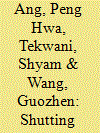| Srl | Item |
| 1 |
ID:
110722


|
|
|
|
|
| Publication |
2011.
|
| Summary/Abstract |
The objective of this paper is to contribute to the topic of energy supply security by proposing a Monte Carlo-based and a survey based model to analyze the costs of power interruptions. Outage cost estimations are particularly important when deciding on investments to improve supply security (e.g. additional transmission lines) in order to compare costs to benefits. But also other policy decisions on measures that have direct or indirect consequences for the supply security (e.g. a phasing out of nuclear energy) need to be based on results from outage cost estimations. The main focus of this paper lies with residential consumers, but the model is applied to commercial, industrial and governmental consumers as well. There are limited studies that have approached the problem of evaluating outage cost. When comparing the results of these studies, they often display a high degree of diversification. As consumers have different needs and dependencies towards the supply of electricity because of varying circumstances and preferences, a great diversity in outage cost is a logical consequence. To take the high degree of uncertainties into account, a Monte Carlo simulation was conducted in this study for the case of private households in Germany.
|
|
|
|
|
|
|
|
|
|
|
|
|
|
|
|
| 2 |
ID:
166508


|
|
|
|
|
| Summary/Abstract |
Electric security is closely related to all aspects of the national macro-economy, but when it comes into considering power policies, the subject of exploring the reasons for large area power outages is often considered as a “separate subject”. This paper proposes a novel evaluation method to analyze and determine the main factors that are commonly found within unsustainable electric power system. This method integrates the fuzzy clustering method, fault tree analysis and an analytic hierarchy process. First, it builds a classification for different factors based on Faulty Tree Analysis methods. Then, the logical relationships between each factors are prioritized and determined. Once the logical hierarchies are established, the Entropy-House of Quality for quantitative analysis is employed to support big blackout prevention and decision-making for various influential factors. Finally, Sichuan province are given to verify its effectiveness so that the policy-makers and security regulators in China can follow its recommendations to create a better electricity supply security management and a more sustainable energy reform in the future.
|
|
|
|
|
|
|
|
|
|
|
|
|
|
|
|
| 3 |
ID:
113967


|
|
|
|
|
| Publication |
2012.
|
| Summary/Abstract |
On 1 February 2005, the Kingdom of Nepal cut off all public telecommunication links to the outside world. According to the king, the shutdown in communications was to enable security operations against the Maoist insurgents. Landline and Internet services were restored gradually over the following weeks. But the pre-paid mobile phone service, which was used by the majority of Nepalese, stayed off for the public for 88 days. The shutdown in communications provided the environment for a natural experiment to look at the impact of the mobile phone. Researchers conducted interviews in three regions of Nepal that are taken by the Nepalese as representative of the country. Among those interviewed were politicians, including the then-prime minister, business owners, journalists, as well as military and police officers. The study found that the shutdown in mobile communications had limited success in helping security operations. The insurgents did not trust the mobile phone network and had developed their own parallel communication network. The larger impact was negative: it hurt the economy and alienated large swathes of the public, perhaps even contributing to the downfall of the king. The study suggests that the mobile phone is a social device and that if there is to be any shutdown of the mobile phone service, it should be done only briefly and for very clear security reasons.
|
|
|
|
|
|
|
|
|
|
|
|
|
|
|
|